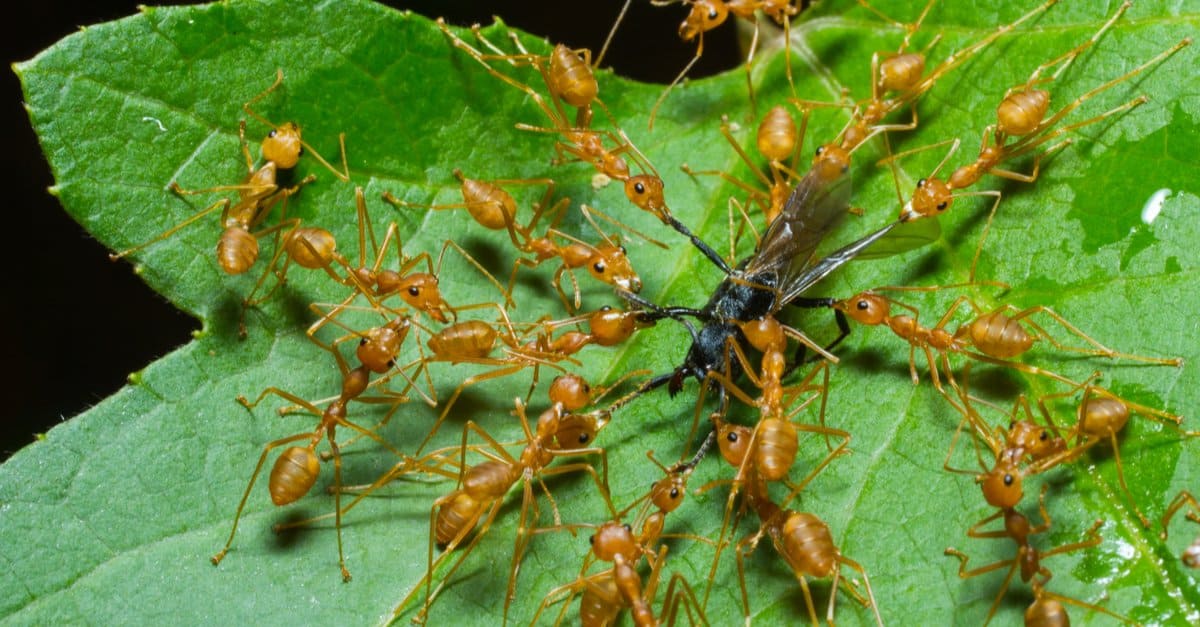Spider mites and ants are both common garden pests that can cause major headaches for gardeners and farmers However, their relationship is more complex than you might think. The answer to “do ants eat spider mites?” reveals an indirect connection mediated by a third party – aphids
What Are Spider Mites?
Spider mites are tiny pests closely related to spiders. There are many kinds, but the two-spotted spider mite and the carmine spider mite are the ones that you most often see in farms and gardens. Adults reach only 1/50 of an inch long.
Mites that feed on plant juices feed on plant leaves and stems. In severe cases, this can lead to yellow spots, browning, wilting, and even death. Mites make webs that stick to leaves and stems that are infested.
What Are Ants?
Ants are social insects that live in colonies containing workers, queens, males, and brood (larvae and pupae). Most ant species feed on sugary substances like nectar and honeydew produced by aphids and other bugs. However, some ant species prey on small arthropods.
The presence of ants in a garden or farm often indicates aphid infestations, as ants “tend” and protect aphid colonies to access their honeydew. Common tending ant species include the argentine ant, southern fire ant, and cornfield ant.
The indirect Connection: Aphids
Aphids and ants have a mutualistic relationship. Aphids produce sugary honeydew which ants harvest as food. In exchange, the ants keep the aphids safe from bugs and other pests.
This relationship indirectly impacts spider mites in two key ways:
1. Ants Reduce Spider Mite Numbers
Research has found that ants tending aphids prey upon spider mites sharing the same plants. A 2017 study published in Experimental and Applied Acarology demonstrated this using kidney bean plants either with or without aphids in ant farm microcosms.
The spider mite populations were significantly lower on plants with aphids The ants patrolling the aphids would prey upon the spider mites as well, There was no evidence of plant-mediated competition between the aphids and spider mites,
2. Spider Mites Don’t Avoid Aphid-Infested Plants
Despite the risk from tending ants, the spider mites did not avoid colonizing bean plants already infested with aphids. The spider mites were able to establish colonies and reproduce on the aphid-tended plants, just at lower rates.
Direct Ant Predation on Spider Mites?
Aphids have some indirect effects on spider mites, but ants don’t seem to be able to directly kill spider mites.
Most ants are predominantly interested in sugary honeydew and nectar. Protein from animal prey is a secondary food source for ants in general.
Spider mites and their eggs are likely too small to be an attractive food source for most ants. Exceptional cases of direct spider mite predation by ants have been recorded in a few species, such as the weaver ant.
But in most gardens and farms, indirect effects via aphids are the primary link between ants and spider mites. Direct predation of spider mites by ants is likely insignificant.
Impact on Pest Control
Understanding the indirect connection between ants, aphids, and spider mites has important implications for integrated pest management programs:
-
Effective aphid control will reduce ant activity and spider mite predation. But spider mites may subsequently increase without ant predation.
-
Preventing ant access to plants and trees can allow higher spider mite populations. But it also reduces honeydew buildup.
-
Releasing predatory mites may be a better biological control than introducing ant predators, as they directly reduce spider mites without increasing honeydew and sooty mold issues.
-
Insecticidal soaps and horticultural oils can control aphids, ants, and spider mites simultaneously, but require thorough coverage.
As in nature, connections between pests are complex. A holistic integrated pest management approach is required to sustainably control infestations.
This complex relationship highlights the importance of understanding pest connections in agriculture and horticulture. Often, a single pest species is tied to a web of indirect effects involving many other species. Successful sustainable pest control requires unraveling and leveraging these intricate connections.

Save citation to file Format:
- Create a new collection
- Add to an existing collection
Name your collection: Name must be less than 100 characters Choose a collection: Unable to load your collection due to an error
Your saved search Name of saved search: Search terms:
- Yes
- No
Email:
Natural solution against Spider Mites for healthy plants #gardening #garden #pestcontrol
FAQ
Do ants like spider mites?
When spider mites leave their protective webs, they are easy prey for ants. Being able to avoid traces of ongoing ant activity should give mites a selective advantage.
What eats spider mites?
Spider mites are mostly eaten by other spider mites and some insects. Some plants can even keep them away. Predatory mites like Phytoseiulus persimilis and Neoseiulus californicus are effective at controlling spider mites, with Persimilis being particularly efficient at consuming them. Other insects like ladybugs, particularly the Stethorus punctum species, and certain lacewings and thrips also prey on spider mites.
What kills spider mites instantly?
Spider mites can be killed instantly with a strong stream of water, rubbing alcohol (isopropyl alcohol), or insecticidal soap.
What do spider mites hate the most?
Plants that repel Spider MitesAllium cepa (Onion) Allium cepa (Onion) . Allium sativum (Garlic) Allium sativum (Garlic) . Allium schoenoprasum (Chives) Allium schoenoprasum (Chives) . Anethum graveolens (Dill) Add to Any Collection. Coriandrum sativum (Cilantro) Add to Any Collection. Rheum rhabarbarum (Rhubarb).
